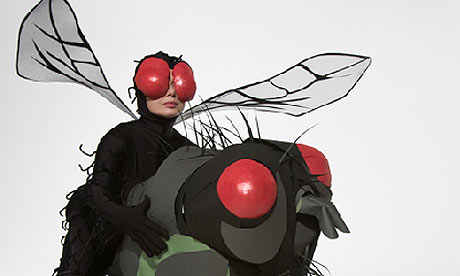
100 Futuristic Designs
When J. G. Ballard, who passed away Sunday, at the age of seventy-eight, was trying to place “Crash,” his dystopian masterpiece of “auto” eroticism, with a publisher, he received a note with a rejected manuscript: “This author is beyond psychiatric help. Do not publish.”
He regarded it as a sign of “complete artistic success.”
“Crash,” as Tom Shone wrote in this magazine in 1997, “rammed into public consciousness in 1973, before backing off into cult status.” Ballard had already made a name for himself as a writer of science fiction that was short on technology—no robots, no spaceships—and so eerily prescient in its portrayal of global warming (floods, famines) that it can hardly be called fiction.
His early work, as he told Shone, was “trying to make sense of what he’d seen as a boy.” Anyone who has read or seen the movie version of “Empire of the Sun,” a fictionalized memoir of Ballard’s time in a Japanese prison camp during the Second World War, knows the story: born James Graham Ballard, in 1930, in Shanghai, to British expatriates, he enjoyed a relatively serene existence until the age of eleven when, following the bombing of Pearl Harbor, the Japanese entered the city and interned all “enemy civilians.” He stayed in the camp for three and a half years.
“Empire” hit shelves in 1984, and offered an uncompromising glimpse of the destructiveness of war. We understand, at the novel’s end, that our hero, Jim, will never fully recover from what he has witnessed.
In any genre, Ballard aimed at challenging assumptions. In a review of his final book, “Miracles of Life: Shanghai to Shepperton, An Autobiography,” Diane Johnson wrote that Ballard
seems to be a mostly unreconstructed Sixties person, suffused with his sense of himself as an artifact of that purer and more honorable time, a member of a countercultural generation that moved through society, in someone’s phrase, “like a rat through a python,” a bulge discernible in the smooth musculature of the rest; but this position can now seem a valuable, even cherishable corrective.
Ballard himself simply wanted to tell the truth through writing:
The bourgeois novel is the greatest enemy of truth and honesty that was ever invented. It’s a vast, sentimentalizing structure that reassures the reader, and at every point, offers the comfort of secure moral frameworks and recognizable characters. This whole notion was advanced by Mary McCarthy and many others years ago, that the main function of the novel was to carry out a kind of moral criticism of life. But the writer has no business making moral judgments or trying to set himself up as a one-man or one-woman magistrate’s court. I think it’s far better, as Burroughs did and I’ve tried to do in my small way, to tell the truth.

One of the original Power Rangers was sentenced to death: Actor SKYLAR DELEON was sentenced to death for murdering an Arizona couple. The child star and Power Rangers regular has been convicted of chaining the couple to the anchor of the luxury yacht they were trying to sell him and throwing them overboard.
I pulled this off of a friend's blog. That's crazy.
----
More information here: http://www.trutv.com/library/crime/notorious_murders/celebrity/hawkes_deleon/1_index.html
A Memorial Website to the murder victims: http://www.tomandjackiehawks.com/



Last Updated: 4:36PM BST 14 Apr 2009
The amazing 'discovery' was apparently made when they opened up Artyom Sidorkin, 28, to remove what they thought was a serious tumour.
Mr Sidorkin had complained of extreme pain in his chest and had been coughing up blood. Doctors were convinced he had cancer.
"We were 100 per cent sure," said Vladimir Kamashev, a surgeon in Izhevsk in the Urals. "We did X-rays and found what looked exactly like a tumour.
"I had seen hundreds before, so we decided on surgery."
Before removing part of the man's lung, the surgeon investigated the tissue.
"I thought I was hallucinating," said Mr Kamashev. "I asked my assistant to have a look: 'Come and see this – we've got a fir tree here'. He nodded in shock. I blinked three times as I was sure I was seeing things."
Medical staff said that Mr Sidorkin must have inhaled a seed, which later sprouted into a small fir tree inside his lung.
The spruce, which was said to be touching the man's capillaries and causing severe pain, was removed.
"It was very painful. But to be honest I did not feel any foreign object inside me," said Mr Sidorkin. "I'm so relieved it's not cancer."
There was no independent verification of the surgeon's claims.
Source: http://www.mosnews.com/weird/2009/04/13/firtree/
and

Isabella Rossellini has found her calling, as the director and presenter of Green Porno, a series of beautifully hand-crafted short films about the sex lives of animals
Read more HERE